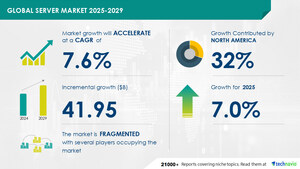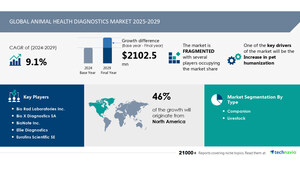NEW YORK, Sept. 11, 2024 /PRNewswire/ -- Report with market evolution powered by AI- The global industrial lubricant additives market size is estimated to grow by USD 1.53 billion from 2024-2028, according to Technavio. The market is estimated to grow at a CAGR of 3.59% during the forecast period. Growth investments in energy industries is driving market growth, with a trend towards growing adoption of industrial lubricant additives in processing and packaging machinery. However, stricter environmental restrictions for formulation of industrial lubricant additives poses a challenge. Key market players include Afton Chemical, BASF SE, BRB International BV, Chevron Corp., Clariant AG, DOG Deutsche Oelfabrik, Dover Chemical Corp., Eni SpA, Evonik Industries AG, Exxon Mobil Corp., FUCHS PETROLUB SE, Infineum International Ltd., Italmatch Chemicals Spa, King Industries Inc., Lanxess AG, Lucas Oil Products Inc., The Lubrizol Corp., Valvoline Inc., and Wuxi Southern Petroleum Additives Co. Ltd..
AI-Powered Market Evolution Insights. Our comprehensive market report ready with the latest trends, growth opportunities, and strategic analysis- View your snapshot now
Forecast period |
2024-2028 |
Base Year |
2023 |
Historic Data |
2018 - 2022 |
Segment Covered |
Application (Engines, Gears, Hydraulic systems, and Steam turbines), Type (Performance enhancing additives, Surface protecting additives, and Lubricant protecting additives), and Geography (APAC, Europe, North America, Middle East and Africa, and South America) |
Region Covered |
APAC, Europe, North America, Middle East and Africa, and South America |
Key companies profiled |
Afton Chemical, BASF SE, BRB International BV, Chevron Corp., Clariant AG, DOG Deutsche Oelfabrik, Dover Chemical Corp., Eni SpA, Evonik Industries AG, Exxon Mobil Corp., FUCHS PETROLUB SE, Infineum International Ltd., Italmatch Chemicals Spa, King Industries Inc., Lanxess AG, Lucas Oil Products Inc., The Lubrizol Corp., Valvoline Inc., and Wuxi Southern Petroleum Additives Co. Ltd. |
Key Market Trends Fueling Growth
The industrial lubricant additives market is experiencing growth due to the increasing use of these additives in processing and packaging machinery. As industries, such as food and beverage, pharmaceuticals, and consumer goods, expand, there is a heightened demand for efficient machinery that can operate under challenging conditions. Advanced lubricant additives are essential for maintaining reliable and smooth machine performance in high-speed, high-pressure, and high-temperature environments. In the food and beverage industry, where cleanliness and equipment reliability are crucial, specialized lubricant additives help prevent contamination and ensure consistent production quality. With the shift towards more automated and high-speed machinery to meet consumer demand, the need for advanced lubricants becomes increasingly important. Companies like Lubrizol, Afton Chemical, and BASF SE are leading this development. Lubrizol provides additives for wear protection and thermal stability, while Afton Chemical focuses on energy efficiency and corrosion resistance. BASF's products enhance machinery durability and operational stability, ensuring consistent and reliable performance. These advancements are vital in supporting the growing demand for high-performance lubricants in processing and packaging operations, driving the growth of the global industrial lubricant additives market. (Exact word count: 50)
The Industrial Lubricant Additives market is experiencing significant growth due to increasing demand in various sectors. Key industries like Textile, Power Generation, Chemicals, Petrochemicals, Agriculture, Manufacturing, and Food Processing are driving market expansion. In Textile, finishing processes rely on lubricant formulations for efficient production. Power Generation requires high-temperature lubricants for utility-scale electricity production. The Chemicals and Petrochemicals industry uses additives like anti-wear additives, thickeners, and tackifiers in lubricant formulation. The Agriculture sector employs food-grade lubricants in processing food products. The Manufacturing sector, including Automobile and Automation industries, utilizes various types of lubricating oils, turbine oils, metalworking fluids, and general industrial oils. The Food Processing sector demands food-grade lubricants for processed food products. Economic growth and the expanding Automobile market fuel the demand for automotive lubricants like engine oils and brake fluids. Patented polymeric and nanotechnology-based additives are gaining popularity for their superior performance. The Utility-scale electricity and Diesel conditioners sectors also rely on advanced additives for optimal equipment performance. Corrosion inhibitors, oil viscosity modifiers, and combustion engine additives are essential additives for various industries. Manufacturing facilities and automation equipment, including robotic equipment, require lubricating oils and greases for smooth operation.
Insights on how AI is driving innovation, efficiency, and market growth- Request Sample!
Market Challenges
- The industrial lubricant additives market faces significant challenges due to increasing environmental regulations. Stricter rules are being imposed to address concerns over emissions, waste, and ecological impact. Regulatory bodies such as the Federal Insecticide, Fungicide, and Rodenticide Act (FIFRA) and the Occupation Safety and Health Administration (OSHA) in the US, European Union's Regulation No 1907/2006, and the Global Reporting Initiative (GRI) set guidelines for the industry. For instance, India's Extended Producer Responsibility (EPR) for used oils, which extends to all producers, collection agents, recyclers, and used oil importers, highlights the growing challenge of stricter environmental restrictions. The Hazardous and Other Wastes (Management and Transboundary Movement) Second Amendment Rules, 2023, further expands the EPR's scope. However, concerns exist about the domestic re-refining industry's ability to manage increasing volumes under the EPR, which aims to expand from 5% to 50% by 2030-2031. These regulations pose challenges for the global industrial lubricant additives market, potentially hindering growth during the forecast period.
- The Industrial Lubricant Additives Market faces several challenges in various sectors. In the automotive industry, meeting emission regulations for Transmission oils, Coolants, Internal combustion engines, and Electric vehicles requires continuous chemical initiatives. Toxicity concerns and environmental regulations call for the development of eco-friendly additives. Consolidation among key players like Chevron Oronite, Evonik Industries, Lubrizol, and Infineum International impacts the market. Viscosity index improvers, Dispersants, and Detergents are essential chemical components for Heavy-duty lubricants and Passenger car lubricants. Renewable energy sources and Energy management are emerging trends. Pollution regulations and fuel economy standards impact the aviation and marine transportation sectors. Additive packs must align with OEM engine blueprints for mechanical engine oils. Anti-wear agents, Antioxidants, and Friction modifiers are critical additives. The vehicle manufacturing decline affects the automotive aftermarket. Future estimations include the growth of aviation transportation, emission controls, and domestic blending facilities. Mineral lubricants remain essential for Compressor oils and Cutting fluids. Hydraulic fluids, Gear oils, and Transmission fluids also require advanced additives. The market is dynamic, with ongoing challenges and opportunities.
Insights into how AI is reshaping industries and driving growth- Download a Sample Report
Segment Overview
This industrial lubricant additives market report extensively covers market segmentation by
- Application
- 1.1 Engines
- 1.2 Gears
- 1.3 Hydraulic systems
- 1.4 Steam turbines
- Type
- 2.1 Performance enhancing additives
- 2.2 Surface protecting additives
- 2.3 Lubricant protecting additives
- Geography
- 3.1 APAC
- 3.2 Europe
- 3.3 North America
- 3.4 Middle East and Africa
- 3.5 South America
1.1 Engines- The industrial lubricant additives market is experiencing steady growth due to increasing demand from various industries. These additives enhance the performance and longevity of lubricants by providing additional properties such as oxidation inhibition, extreme pressure protection, and rust prevention. Manufacturers are focusing on research and development to introduce innovative additives that cater to specific industry requirements. The market is driven by factors like rising industrial production, growing automotive sector, and increasing awareness of energy efficiency.
Download complimentary Sample Report to gain insights into AI's impact on market dynamics, emerging trends, and future opportunities- including forecast (2024-2028) and historic data (2018 - 2022)
Research Analysis
The Industrial Lubricant Additives Market encompasses a wide range of products that enhance the performance of various types of lubricants. These additives include automation and robotic equipment additives, corrosion inhibitors, and additives for specific industrial applications such as turbine oils, metalworking fluids, general industrial oils, greases, and heavy-duty lubricants. The market also caters to the automotive sector with additives for combustion engines, automotive lubricants, engine oils, brake fluids, transmission oils, coolants, and electric vehicles. Additives play a crucial role in improving oil viscosity, energy management, emissions reduction, and the overall efficiency of manufacturing facilities. The market comprises chemical components like base oils, solids, and additives used in the production of lubricants for various industries, including automotive, energy, marine transportation, and heavy industry.
Market Research Overview
The Industrial Lubricant Additives Market encompasses a wide range of products used to enhance the performance of various types of lubricants. These additives include automation and robotics-enhancing agents, corrosion inhibitors, viscosity index improvers, dispersants, detergent, and anti-wear agents, among others. Applications span across multiple industries, such as manufacturing facilities, automotive lubricants, renewable energy sources, and aviation transport. Key additives include chemical components like base oils, solids, and heavy-duty lubricants. The market is influenced by factors like consolidation, environmental regulations, toxicity, and chemical initiatives. Renewable energy sources and electric vehicles are emerging trends. Companies focus on energy management, emissions, and fuel economy standards. Additives are used in various types of lubricants, such as automotive engine oils, transmission fluids, hydraulic fluids, gear oils, compressor oils, cutting fluids, and food-grade lubricants. Industries served include power generation, chemicals, petrochemicals, agriculture, manufacturing, textile finishing, and food processing. Future estimations indicate continued growth in the market, driven by advancements in technology, increasing demand for energy efficiency, and regulatory requirements. The market is expected to expand in sectors like aviation transportation, emission controls, and the automotive aftermarket. Domestic blending facilities play a crucial role in the market's supply chain. Mineral lubricants, compressor oils, and high-temperature lubricants are some of the key product segments. The market is influenced by factors like vehicle manufacturing decline, pollution regulations, and economic growth. Overall, the Industrial Lubricant Additives Market is a dynamic and evolving industry that plays a crucial role in enhancing the performance and efficiency of various industrial processes.
Table of Contents:
1 Executive Summary
2 Market Landscape
3 Market Sizing
4 Historic Market Size
5 Five Forces Analysis
6 Market Segmentation
- Application
- Engines
- Gears
- Hydraulic Systems
- Steam Turbines
- Type
- Performance Enhancing Additives
- Surface Protecting Additives
- Lubricant Protecting Additives
- Geography
- APAC
- Europe
- North America
- Middle East And Africa
- South America
7 Customer Landscape
8 Geographic Landscape
9 Drivers, Challenges, and Trends
10 Company Landscape
11 Company Analysis
12 Appendix
About Technavio
Technavio is a leading global technology research and advisory company. Their research and analysis focuses on emerging market trends and provides actionable insights to help businesses identify market opportunities and develop effective strategies to optimize their market positions.
With over 500 specialized analysts, Technavio's report library consists of more than 17,000 reports and counting, covering 800 technologies, spanning across 50 countries. Their client base consists of enterprises of all sizes, including more than 100 Fortune 500 companies. This growing client base relies on Technavio's comprehensive coverage, extensive research, and actionable market insights to identify opportunities in existing and potential markets and assess their competitive positions within changing market scenarios.
Contacts
Technavio Research
Jesse Maida
Media & Marketing Executive
US: +1 844 364 1100
UK: +44 203 893 3200
Email: [email protected]
Website: www.technavio.com/
SOURCE Technavio

WANT YOUR COMPANY'S NEWS FEATURED ON PRNEWSWIRE.COM?
Newsrooms &
Influencers
Digital Media
Outlets
Journalists
Opted In





Share this article